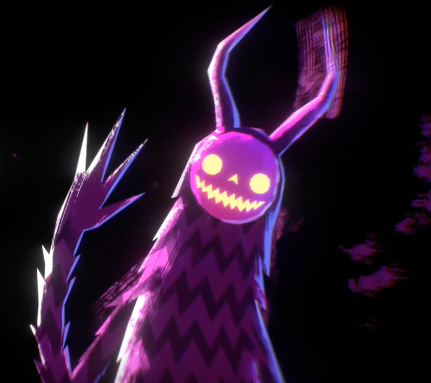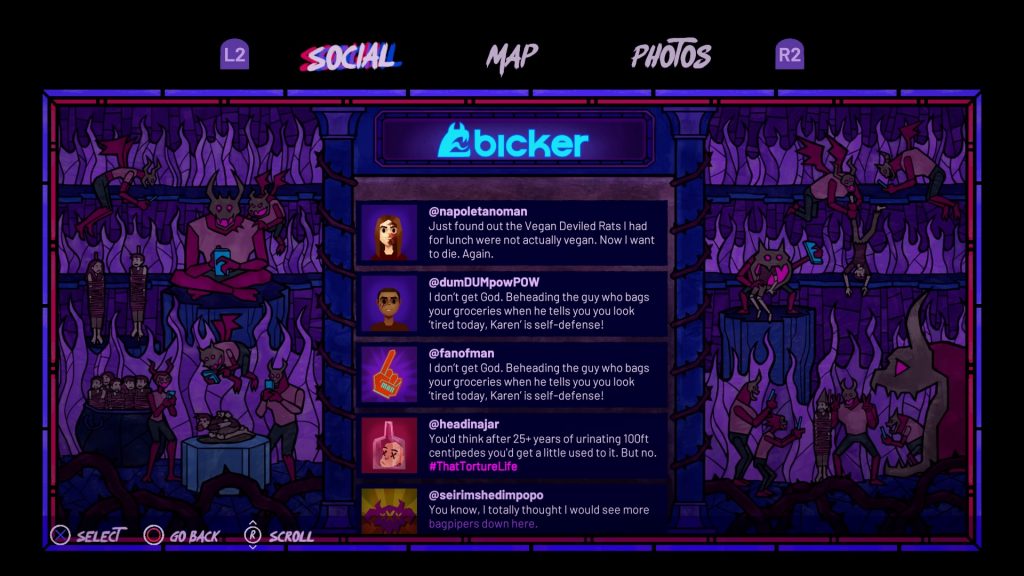Sometimes in college you wonder if there is a ‚real life‘ in a ‚real world.‘ Milo and Lola won’t find an answer, because the two outsiders died after their graduation party and are now facing afterlife in hell. To get out of hell they have to outsmart demons, find the right cocktail to unlock new conversational options, and outdrink Satan himself.
Like in Oxenfree, a prior production by the very same Night School Studio, choosing between different dialog options, but this time you can unlock new options depending on the selected drink. Each drink has it’s unique name and their effects are different. So choose wisely.

But Afterparty isn’t merely a drinking simulator––it is about the friendship between Milo and Lola, about growing up and facing inner demons. From time to time we encounter our own personal demon Wormhorn, whose personality and appearance mix a Cheshire Cat and Louise from Bob’s Burgers. Her task is to torture us with moral comments about our decisions throughout the game and scenes from our childhood. Admittedly, this might sound annoying at first: after all, we are here to party and finally free to do all the wrong stuff. Going to hell is hardly a threat anymore. However, Wormhorn turns out to be an enchanting character and certainly one of the highlights of Afterparty. She is voiced by an immaculate Erin Yvette, who also voiced Alex in Oxenfree, and brings the character to live. The appearance of Wormhorn provides a little break from the main story as well. When she appears, it is like watching an old Halloween cartoon infused with fresh purble blood.
Besides Wormhorn there are a lot of other character encounters like the charming hell cab driver Sam.
No game about partying in hell would be complete without party games though: dance-offs, beer pong and outdrinking are implemented mini-games, simple as such, and not particularly creative. For example: you have to win a dancing competition by pushing buttons as they are displayed. If you lose, you can start again. Who would expect that demons are so friendly, that they give you a second chance? While these mini-games are a neat break from elaborate chunks of dialog within the rest of the game, they are at the same time your daily torture––you may enjoy it a little bit, but you are happy when it is over.
Afterlife also brims with social commentary: demons have jobs they complain about, you get tortured from 9 to 5 and after that you drown your sorrows in booze. From time to time cynical subtexts pepper the dialog. And of course there has to be social media in hell, because there is no better way to effectively torture. bicker is Afterlife’s version of twitter. This kind of satire about social media isn’t new, but the setting is refreshing and the idea of demons walking around bickering is at least a funny idea. But bicker––much its non-diegetic pendant––can be really annoying as the influx of posts distracts you from an ongoing conversation.

Afterparty is a well done short graphic adventure with a unique and beautiful style. It makes you think about sins for four to five hours, which fits the setting perfectly since Milo and Lola only have one night to get out of hell. So it effectively fells like a really long Friday night. If you expect the clean experience of an American Pie style excess, Afterparty might not be for you though as it slows down frequently to make room for conversations about friendship, family, anxiety, and even the moral consequences of choices we make.